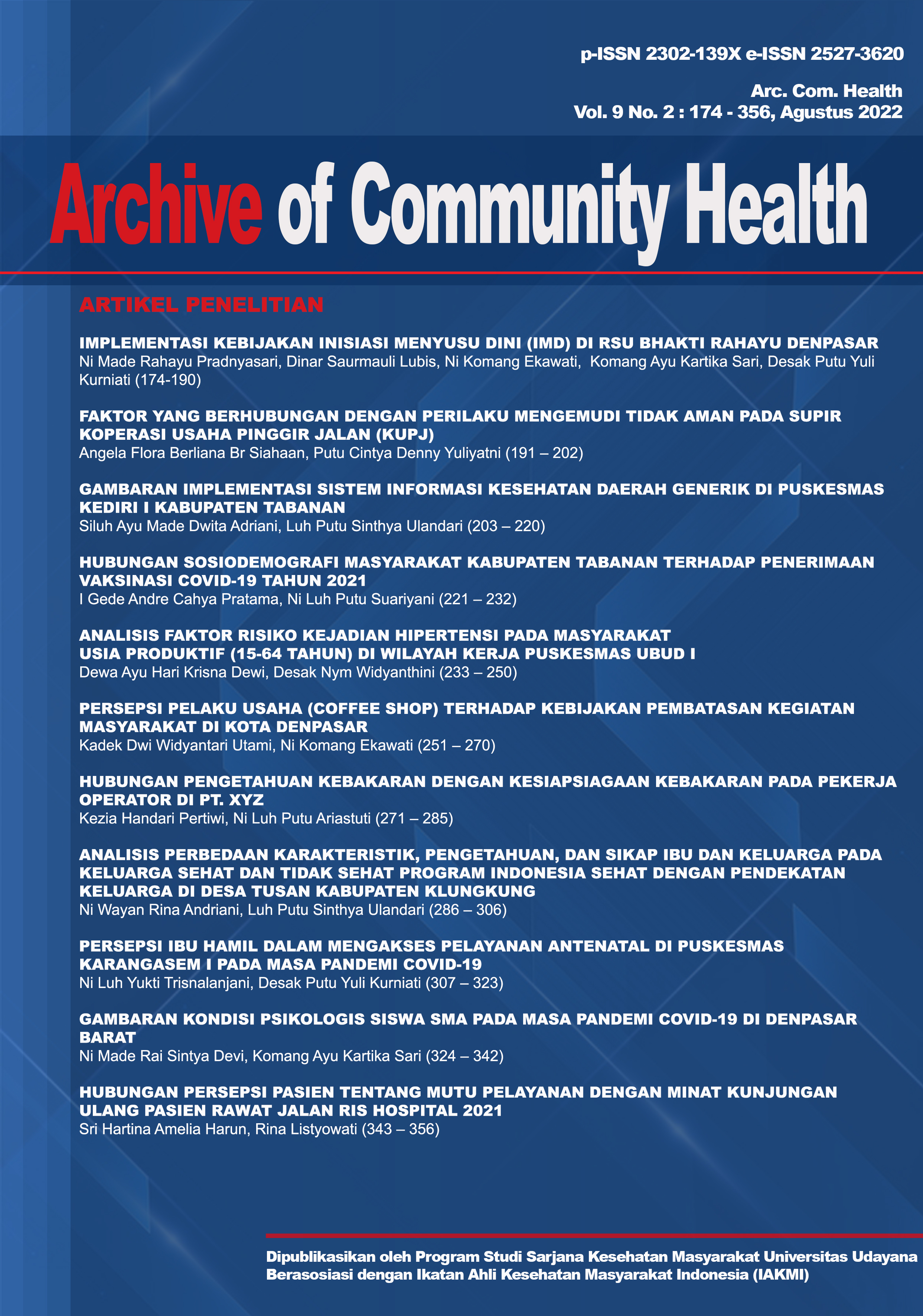PERSEPSI PELAKU USAHA (COFFEE SHOP) TERHADAP KEBIJAKAN PEMBATASAN KEGIATAN MASYARAKAT DI KOTA DENPASAR
Abstract
ABSTRAK
Pelanggaran Pemberlakuan Pembatasan Kegiatan Masyarakat (PPKM) hingga saat ini masih terjadi. Banyak Coffee Shop tidak mengindahkan kebijakan PPKM sehingga berisiko meningkatkan penyebaran Covid-19. Tujuan penelitian untuk mengetahui persepsi pelaku usaha (Coffee Shop) terhadap PPKM di Kota Denpasar. Desain penelitian yaitu deskriptif kualitatif. Informan penelitian yaitu tujuh orang pelaku usaha (Coffee Shop) di mal dan luar mal di Kota Denpasar. Teknik pengumpulan data yaitu wawancara mendalam dan observasi. Teknik analisis menggunakan analisis tematik. Hasil penelitian yaitu pelaku usaha mempersepsikan Coffee Shop tidak rentan menjadi kluster Covid-19 dikarenakan sudah menerapkan pola hidup sehat dan protokol kesehatan. Persepsi manfaat, pelaksanaan PPKM tidak memberikan manfaat dari segi profit melainkan dari segi perilaku kesehatan masyarakat. Persepsi hambatan pelaksanaan PPKM lebih banyak dirasakan oleh Coffee Shop yang berdiri sendiri bukan di mal yaitu tidak adanya sosialisasi kebijakan secara langsung. Adapun dorongan dari pelaku usaha menerapkan PPKM yaitu mempertahankan keberlangsungan usaha dan membangun images positif. Penerapan PPKM di mal lebih baik daripada di luar mal karena sosialisasi dan monitoring langsung yang diberikan oleh pihak mal. Bagi dinas terkait agar melakukan sosialisasi terkait Covid-19 serta urgensi kebijakan PPKM dalam upaya kolaborasi penanggulangan Covid-19. Bagi pihak mal atau desa adat terkait agar melakukan monitoring dan evaluasi terkait pelaksanaan PPKM.
Kata Kunci: Covid-19, Coffee Shop, Persepsi, PPKM, Health Belief Model
ABSTRACT
Violations of the Implementation of Community Activity Restrictions (PPKM) are still happening. Many Coffee Shops do not heed the PPKM policy so they risk increasing the spread of Covid-19. The purpose of the study was to determine the perception of business actors (Coffee Shop) on PPKM in Denpasar City. The research design is descriptive qualitative. Research informants are seven business people (Coffee Shop) in malls and outside malls in Denpasar City. Data collection techniques are in-depth interviews and observation. The analysis technique uses thematic analysis. The results of the study are that business actors perceive that Coffee Shops are not vulnerable to being a Covid-19 cluster [u1] because they have implemented a healthy lifestyle and health protocols. Perceived benefits, the implementation of PPKM does not provide benefits in terms of profit but in terms of public health behavior. The perception of barriers to implementing PPKM is felt more by coffee shops that stand alone, not in malls, namely the absence of direct policy socialization. The encouragement from business actors to implement PPKM is to maintain business continuity and build positive images. The implementation of PPKM in malls is better than outside malls because of socialization and direct monitoring provided by the mall. Relevant agencies are required to carry out socialization related to Covid-19 and the urgency of PPKM policies in collaborative efforts to overcome Covid-19. For the relevant mall or traditional village to carry out monitoring and evaluation related to the implementation of PPKM.
Key Words: Covid-19, Coffee Shop, Perception, PPKM, Health Belief Model














